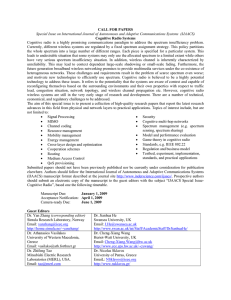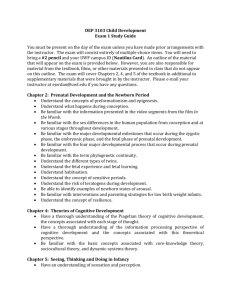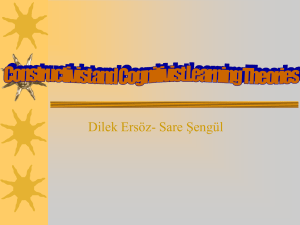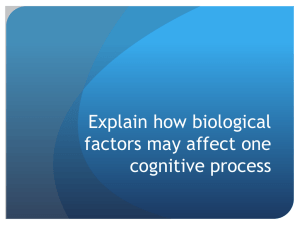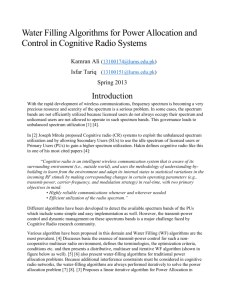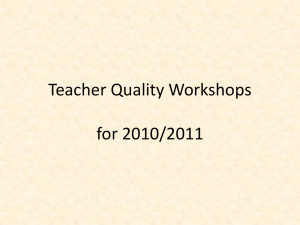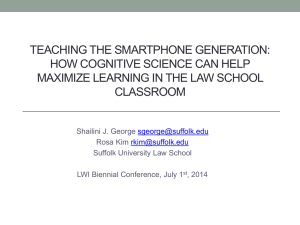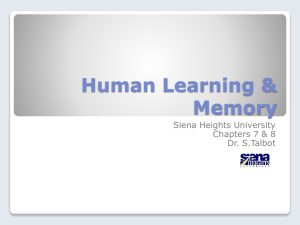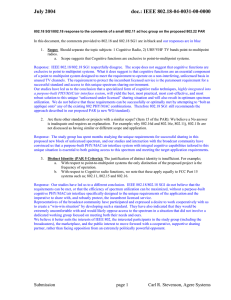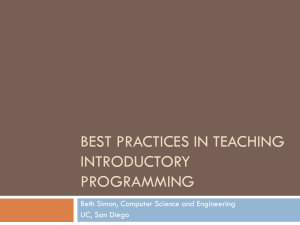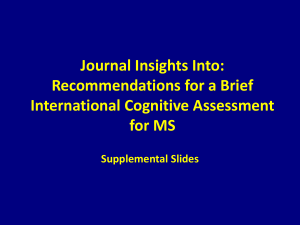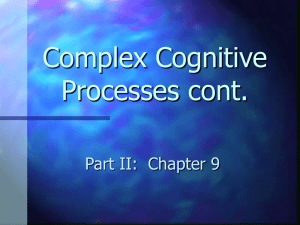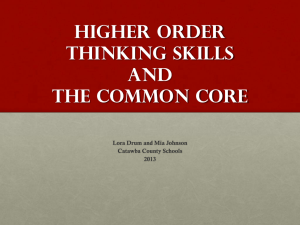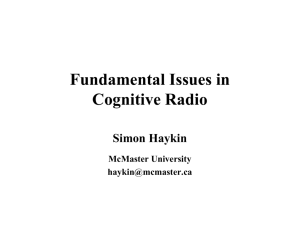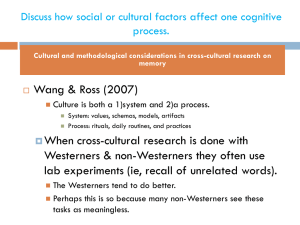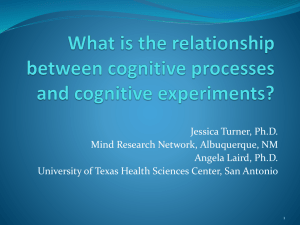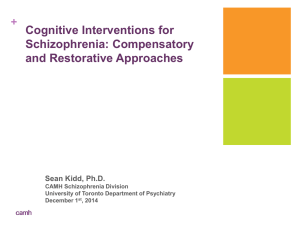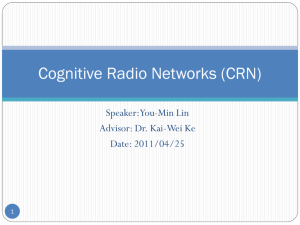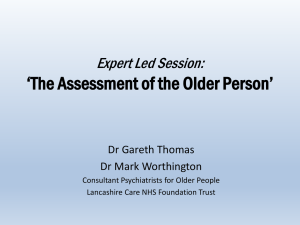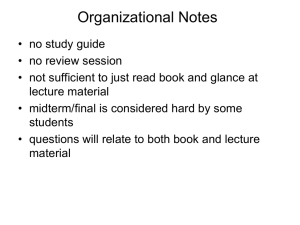here - QoSMOS
advertisement
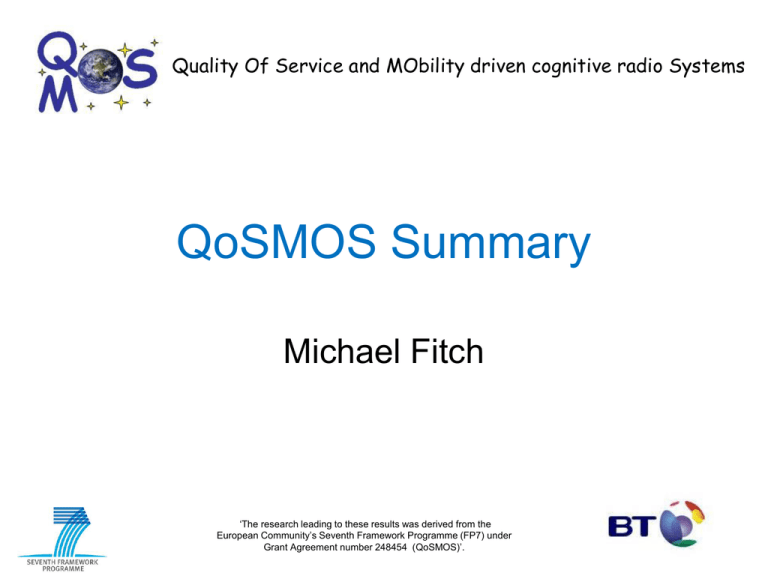
Quality Of Service and MObility driven cognitive radio Systems QoSMOS Summary Michael Fitch ‘The research leading to these results was derived from the European Community’s Seventh Framework Programme (FP7) under Grant Agreement number 248454 (QoSMOS)’. At a glance • Quality of Service and MObility driven cognitive radio Systems • Is an FP7 Integrated Project – Call 4 objective ICT-2009.1.1; The Network of the Future, part (b): Spectrum-efficient radio access to Future Networks – Duration is 36 months from January 2010 • Budget – 1198 PMs – Total = 14.5M€, EC contribution = 9.4M€ Date, slide number Partners Participant no. * Participant organisation name 1 (Coordinator) 2 3 4 5 6 7 8 9 10 11 12 British Telecommunications PLC Telenor ASA Commissariat à l’Energie Atomique Oulun Yliopisto Technische Universität Dresden Instituto de Telecomunicões NEC Technologies (UK) Ltd Agilent Technologies Belgium NV Thales Communications SA University of Surrey NEC Corporation Fraunhofer-Gesellschaft zur Förderung der angewandten Forschung e.V. 13 14 15 TST Sistemas SA Alcatel-Lucent Deutschland AG Budapesti Műszaki Gazdaságtudományi Egyetem 8 April 2015, 3 Part. short name BT TEL CEA UOULU TUD IT NTUK AGILENT TCF UNIS NEC Fraunhofer TST ALD és BME Country United Kingdom Norway France Finland Germany Portugal United Kingdom Belgium France United Kingdom Japan Germany Spain Germany Hungary External Advisory Board Agence Nationale des Fréquences (ANFR) Bundes Netz Agentur (BNetzA) Radio Communications Agency, Netherlands (Agentschap Telecom) AT4 Wireless SDR Forum Südwestrundfunk (SWR) BBC Microsoft Association of Professional Wireless Production Technologies e.V. (APWPT) 8 April 2015, 4 Why do we need QoSMOS ? • To develop a framework to improve utilisation of radio spectrum, consistent with co-existence with other services and opening up of the mobile broadband value chain, • A cognitive approach to align with the strategies of the regulators • A pan-European effort with a range of partners is needed to bring all the pieces together and move them close to market 8 April 2015, 5 Objectives • The main objective is to provide a platform for efficient radio access to future networks • Under this are two S & T objectives – Cognitive Wireless Access Provision [measurable criteria] • Platform aspects • Intelligence aspects – Network Support Provision [measurable criteria] • And two non-S & T objectives – Use-case development [guidelines on marketing] – Preparation of regulatory policies [response of regulators] 8 April 2015, 6 Concept A significant novelty is a two-step spectrum management process An upper cognitive manager that manages the spectrum portfolio A lower cognitive manager that allocates resource 8 April 2015, 7 Allocation of workpackages to objectives 8 April 2015, 8 Workplan 8 April 2015, 9 Milestones are EAB meetings • MS1 – month 2 (should have been Feb 2010) – Workshop, ‘Setting the scene’ – Introduction to the project, planning, use-case review • MS2 – month 11 (November 2010) – Workshop, ‘Spectrum portfolio and scenarios’ – review and ratify initial scenarios, architectures, models and frameworks • MS3 – month 19 (July 2011) – with Industry – Workshop, ‘Regulation impact and impact on regulation’ – Disseminate, review and ratify Consolidated Scenarios, Architecture description of cognitive and spectrum manager functions and test-bed design 8 April 2015, 10 Milestones are EAB meetings • MS4 – month 30 (June 2012) – Workshop, ‘Opportunities and chances, new models for new actors’ – Review results of Simulations and Models, demonstrations of cognitive functions and transceiver platform • MS5 – month 36 (December 2012) – with Industry – Workshop, ‘Way forward – the QoSMOS legacy’ – Final demonstration, downstream final designs The output from each of the 5 milestones will be a restricted report 8 April 2015, 11


